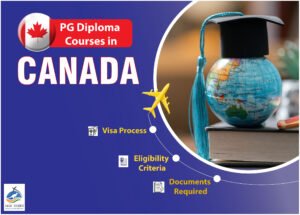As an overseas student, a journey to study abroad is an exciting path to broaden your educational and professional horizons. You can enrich your life and potentially establish a permanent future in a high-quality living country by presenting your foreign academic credentials and work experience. Canada, renowned for its high-quality education and welcoming nature, is a top destination for students wishing to study abroad. This article will reshape the landscape for those studying abroad in Canada by exploring the significant updates to the Canada student visa rules.
Prospective and current international students must understand the changes introduced by the Canadian government regarding educational and post-graduation opportunities. Whether you’re planning to apply for a student visa for Canada or are currently navigating the complexities of the process, understanding these changes is essential.
This article will cover essential topics every prospective student should know:
- New 2024 Canada student visa rules for international students.
- Temporary limits on the number of study permits Canada can issue.
- Recent changes affecting Post-Graduation Work Permit (PGWP) eligibility.
- Update on Open Work Permit eligibility for spouses.
- Revisions to the cost of living in Canada for international students.
This post will provide the latest Canada student visa news on application adjustments and work permit eligibility to help plan your educational journey. Let’s dive in!
1. Temporary restriction on issuing Canadian study permits
As of January 22, 2024, the Canadian federal government imposed a two-year entry limit on Canada study permit applications. Approximately 360,000 new study permits are being set as a limit by the government, resulting in a reduction of 35% compared to 2023. Later this year, they will evaluate and determine the limit.
International students at different educational levels are affected by this development differently. Faster-growing Canadian provinces and territories will impose more significant reductions in new international graduate student enrolments for each of them. For example, a 50% reduction in study permit approvals is expected by Ontario.
Universities and colleges within each jurisdiction of provincial and territorial governments are given specific study permit limits to be set by the governments. Importantly, these limits will not affect international students pursuing master’s or doctoral degrees in Canada.
These new restrictions will not apply to international students who are renewing their study permits. This update is important as it impacts the planning and decision-making of prospective and current students considering studying in Canada.
2. What is the effect of the international student cap on study permit applicants?
As an international student, you may wonder how the new study permit cap affects your chances at Canadian DLIs. Canadian academic institutions are expected to experience more intense competition for admission as a result of fewer approved study permits.
Applying for a master’s or doctoral program in Canada likely means stable chances of obtaining a study permit. Students aiming for graduate programs like a bachelor’s degree, diploma, or certificate may face more difficulties obtaining a study permit. In Ontario, British Columbia, and Nova Scotia, applicants may face increased competition as study permit allocations decrease.
Starting January 22, 2024, students are required to submit a Provincial Attestation Letter (PAL) in their study permit applications for the intended province or territory. New requirements, including this one, demand additional proof of application validity. They complement existing requirements such as the acceptance letter and financial support proof.
3. Amendments to the eligibility requirements for the Post-Graduation Work Permit (PGWP)
A public-private partnership (PPP) institution will not issue a PGWP to international students who begin a program of study with the institution after May 15, 2024, under a course licensing agreement. Below are the causes of PPP Institution Graduates’ Exclusion:
Private colleges typically enter into course licensing arrangements with public colleges to offer their curricula. These PPP institutions undergo less regulatory oversight despite their involvement.
A few PPP institutes in Canada have raised concerns among the government that they are not providing adequate educational value to overseas students. So, international students will now be protected from exploitation by profit-driven entities, and the Canadian education system’s integrity will be maintained through stringent measures.
In another significant development, the PGWP program is undergoing a significant change. Graduates with a Master’s degree are now eligible to obtain a three-year work permit, irrespective of the duration of their study program. The previous policy matched the PGWP duration with that of the study program, but this new change departs from that rule.
Master’s graduates can increase their chances for permanent residence (PR) programs such as the Canadian Experience Class (CEC), Federal Skilled Worker (FSW), and Provincial Nominee Programs (PNPs) by taking advantage of this extended eligibility period, which gives them more time to gain valuable Canadian work experience. Highly skilled individuals are being actively attracted and retained in Canada through this reform, which is part of a broader effort.
4. Additional eligibility of spouses for open work permits
Spouse open work permits (were available to spouses of foreign students attending qualified full-time study programs in Canada until 2023. Only spouses of master’s, doctoral, and professional school students (law, medicine) will be eligible for open work permits under section C42. Spouses of international students registered in undergraduate and other college programs will no longer be eligible for open work permits.
5. Increase in cost-of-living requirement for international students
Effective January 1, 2024, the financial requirements for international students studying in Canada have seen significant changes. Previously set at $10,000, the cost-of-living requirement has increased to $20,635 annually, excluding tuition fees. International students planning to study in Quebec must demonstrate a minimum proof of financial support of $15,078, except those under 18, as they need to show access to at least $7,541.
After January 1, 2024, Canadian study visa applicants must provide adequate financial documentation to meet updated criteria. Crucially, as an international student, you need to have these funds accessible to cover your living expenses while studying; you do not have to pay Immigration, Refugees and Citizenship Canada (IRCC) or your university.
6. Why Increase the Cost of Living Requirement?
In the past, international students have struggled financially due to the rising living expenses in Canada. Increasing financial proof requirements the government aims to help international students focus on academics without the burden of financial stress.
Higher living costs may require budget adjustments, but clear communication on financial needs benefits incoming students in Canada. These policy changes are part of broader efforts to strengthen the sustainability and effectiveness of Canada’s international student program.
Given recent rule changes for studying in Canada, it is crucial to approach your application process with a well-thought-out strategy. I urge all prospective students to consult our academic experts at Saga Studies before submitting their applications.
Our team knows the latest changes and can offer personalized advice to strengthen your application under the new rules.
Together, we can fully prepare you and increase your chances of academic and career success in Canada.






